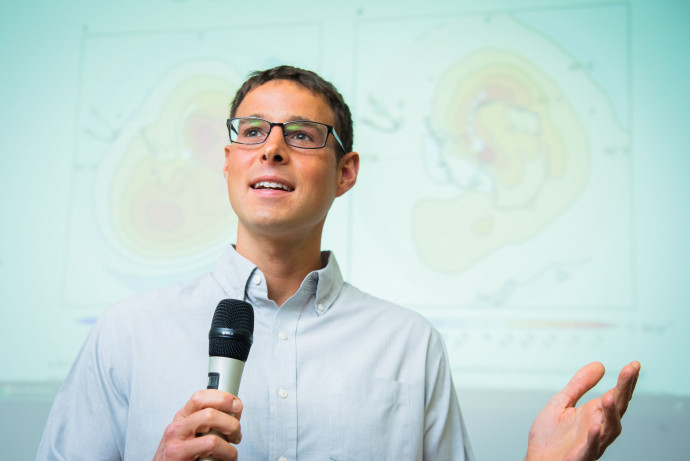2021 Hamilton Award: Not even the South Pole is immune to global warming

Dr Kyle Clem, Te Herenga Waka Victoria University of Wellington, has been awarded the 2021 Hamilton Award, Royal Society Te Apārangi Early Career Research Excellence Award for Science, for his research on the warming of the remote interior of Antarctica, including the South Pole – once thought to be immune to global warming. Using observations, atmospheric reanalyses, and climate models investigating natural and anthropogenic drivers of Southern Hemisphere and Antarctic climate change, Kyle’s research shows that Antarctica’s interior is actually one of the fastest warming places on Earth.
Several of Kyle’s recent papers have focused on the remote influences on Antarctic climate, how variability in tropical sea surface temperature is tied to recent changes in surface temperatures, and sea ice and surface melt. These papers have tested and challenged established theories of the changes to the Antarctic climate.
One paper in which Kyle was the lead author looked at warming in the South Pole during the past three decades and it was published in Nature Climate Change in July 2020. This paper presents two major scientific advances: firstly, it shows that nowhere in Antarctica is immune to anthropogenic climate change, therefore showing that nowhere on Earth is immune. As the Sydney Morning Herald noted of Kyle’s finding, “there’s nowhere to hide” from global warming. Secondly, natural and anthropogenic processes, in this case the natural warming of sea surface temperatures in the western tropical Pacific (10,000km away from Antarctica) and the continued increasing of anthropogenic greenhouse gases, can work together to produce extreme multi-decadal warming in the Antarctic interior.
When considering future climate variability and change in Antarctica, including extreme climate events or surface melt, Kyle’s research has shown that it is important to consider that extreme changes can occur rapidly, be driven by natural processes, and be forced by processes which seem to be far-removed from Antarctica. He has shown the true vulnerability of remote polar regions to warming, having identified the different influences of Antarctica’s warming. Kyle’s research offers crucial insights of global significance regarding the future of increasing global temperatures working alongside natural variations.
In 2020, Kyle received a Marsden Fund Fast-Start grant for his research into ‘Understanding Zonal Wave Three and Its Impacts on Southern Hemisphere Climate Extremes’. He has also been awarded the Antarctic Science Platform Early Career Development Fund in 2019 and the Faculty of Strategic Research Grant, Victoria University of Wellington 2016 and the Edward Kidson Medal, Meteorological Society of New Zealand in 2020 among other funding, prizes, and honours.
Upon receiving the award, Kyle said: “I am deeply honoured to receive this award. There is a tremendous amount of outstanding early-career research taking place across New Zealand, and it is humbling just to be nominated and considered for the award. The award ultimately recognises the team of support behind me who has trained, encouraged, and at times carried, me throughout my research journey: firstly my mom who entertained by childhood passion for the weather; my grandparents who were crazy enough to support me in studying meteorology without a clear career path; Ryan Fogt, my first research advisor, who sparked my interest in Antarctic climate (showing me there is more to meteorology than tornadoes), and then proceeded to train and advise me for my MSc and never left side (still to this day) throughout my PhD and postdoctoral studies; James Renwick, my PhD supervisor who has supported and encouraged me, wrote countless reference letters for me, and gave me the opportunity to study in New Zealand twice (I’m not leaving this time!). Without this team of support and incredible mentorship this award would not be possible, and I deeply thankful that I am able to do what I love every day-study the wild and ever-changing weather and climate in Antarctica!”
Award:
For emerging researchers in social sciences research in New Zealand.
Citation:
To Kyle Robert Clem for revealing Antarctica's remote interior is one of the fastest warming places on Earth.
